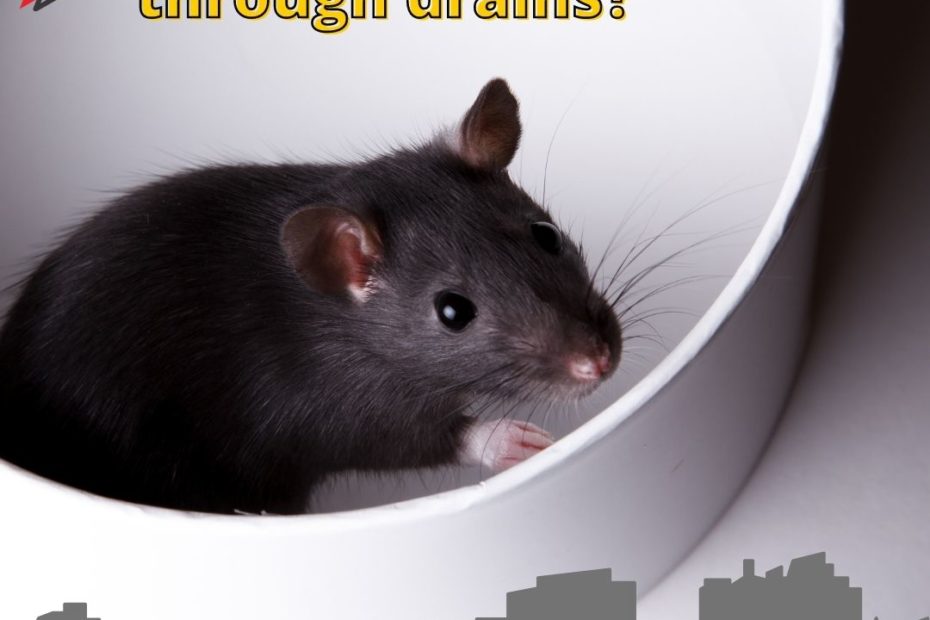There are a lot of things to worry about when it comes to your home, and one of the most common fears is that of rodents.
Mice and rats can get into your house through any opening, no matter how small, and can cause a lot of damage in a very short amount of time.
One of the ways that rats and mice get into your home is through the drains.
It’s important to know whether or not your home is susceptible to rodent invasions so you can take the necessary precautions to prevent them from entering in the first place.
Rats and mice can cause a lot of damage to your property and contaminate your food, so it is important to take measures to protect your home from these pests.
Why do rats and mice go into the sewer?
The sewer is a favorite haunt of rats and mice.
Food is washed down sinks and feces containing partially digested nutrients are flushed down toilets.
Rodents will eat any of this food, and the sewers provide them with protection from predators. It’s no surprise that sewers have significant rat populations under these settings.
Rats and mice residing in the sewer beneath your home are unlikely to bother you until they find a new home. A rat or mouse may opt to relocate for a variety of reasons:
- Rats can find a lot of food in the sewer, but it isn’t endless. When the rat population grows to the point that there is no longer adequate food, the rodents will look for a new habitat.
- The loud noises, vibrations, and other changes that occur during construction drive rats out of the sewers and into the search for a haven.
- Rats and mice are good swimmers, but during floods, the sewer may become too full for them to live comfortably.
So when they decide not to continue in the sewer, they go through the drains until they reach your house.
Can a rat or a mouse come up the drain?
Yes, they can. A rat or a mouse can exit the sewer system through a breach in the line or a drain.
Climbing, swimming, and squeezing through narrow areas are among the skills that these rodents possess.
They are unaffected by dry or wet drains, and pipe features such as U-bends only slow them down somewhat.
There’s a good chance that rats or mice can come up the drain.
Rats or mice are notorious for being able to get into tight spaces, so it’s likely that if there’s an opening big enough for their head, they’ll be able to make their way up the drain pipe.
These rodents are excellent at running and climbing both horizontally and vertically across pipes, drains, and along surfaces, to name a few ways they can take advantage of drains.
Why do rats and mice go through drains?
There are several reasons why rats or mice choose to take up residence in drains:
- Rats and mice often go through drains to find their way into the home.
- The rodents are looking for an escape route.
- They are looking for entry points. like air vents, pipes, and attics.
- Rodents thrive in drains because they can get plenty of food and water from the rubbish we flush away.
- The rodent will crawl up the inside of the drain pipe and eventually emerge in the dishwasher or laundry room.
How do you know if there are rats or mice in the drains?
If you are concerned that there may be rats or mice in your drains, there are some signs that rats and mice are in your drains:
- Blocked plumbing.
- Continuous creaking noises from your pipes.
- Water is running slower than usual.
- Rat-infested drain pipes with white debris.
Also, there are a few things you can do to check:
- Examine your pipes for any cracks, bends, or other irregularities.
- Examine any stonework or gutters that are near drain pipes.
- Listen for scraping noises or what sounds like water rushing through your pipes.
How do you get rid of a rat or mouse in your drain?
There are several things to bear in mind when getting rats and mice out of your drains, as well as several strategies to discourage the rodents from setting up shop:
-
Drains and pipes should be inspected.
You’ll want to make sure your pipes are secured and have no easy entry sites for rodents.
This essentially means that there are no visible apertures around the discharge stack, or, even worse, openings or holes within the pipes themselves.
If you detect any openings during a normal examination around your home, you should contact a drainage professional right once to get the problem fixed.
-
Rodent Deterrents should be used.
You’re likely to have a covered inspection chamber outside your house.
This is beneficial since it provides an easy entry route for rats to avoid entering your home through the sewage system.
A non-return valve, which is a stainless steel flap that attaches to the sewer drain, can prevent the rats from entering the sewer (flush your toilet to see which pipe takes the waste out).
The valve features a flap on one end that allows wastewater to pass through but locks in place on the other side to prevent rats from entering from the other side.
This gadget is simple to set up and can halt rats in their tracks from entering the sewer.
-
Traps for rats or mice
Rats and mice can also get easy entry to your home through ventilation pipes, necessitating the use of anything more akin to a trap to keep the rats out.
When strolling about your property, rats may try to enter from the outside if you have a discharge stack.
Small metal cages can be installed directly above the pipes in the discharge stack.
The rats or mice will be trapped in these cages and will not be able to reach the discharge pipe.
As you set rat or mouse traps, you are likely to get rodent babies and you must know what to do with them.
How do you prevent rats or mice from entering your drains?
Once you’ve determined that rats or mice are present in your sewer system or drainage pipes, you’ll want to take precautions to ensure that they no longer have access:
-
Shut the toilet lid:
When a rat emerges from a toilet drain, it leaps from the bowl to the toilet rim.
If the rat or mouse gets into the toilet bowl with the lid closed, it is imprisoned and will most likely turn around and swim back down the sewer drain to locate another outlet.
-
Cover your drains:
To keep rats or mice out, cover drains with screens or grates that fit securely over them.
Inspect the covers regularly to ensure they are in good working order; if they loosen or rust over time, they will need to be replaced.
-
Repair broken sewer lines:
Sewer line breaks are more prevalent than you might believe. Leaks on your property might be caused by tree roots and age.
While broken lines do not allow rats to enter your property through sewers, they do enhance the rat population.
Furthermore, rats or mice exiting broken pipes may tunnel along the line and enter your home through the pipe hole.
-
Remove all sources of food or water.
Rats, like any other rodent infestation, prefer to live near places where they can get the food and water they need to survive.
Keeping food in sealed storage containers, such as pet food or bird feed, removing unnecessary storage to keep places like garages and sheds tidy.
Don’t put anything down your drains that shouldn’t be there, such as large pieces of food in your garbage disposal or sanitary napkins in your toilet, will all help keep these pesky rodents out of your drains.
In conclusion, when it comes to rats and mice, you want to take every precaution possible to keep them out of your home. Not only are they known for carrying diseases, but they can also cause a lot of damage by chewing through wires and cables. If you have a rodent infestation, it’s important to call a professional exterminator as soon as possible.
Rodent Exterminator employs the best professional exterminators in all of Los Angeles! We have a wide variety of services to suit the rodent infestation in your home.
Don’t worry about mice or rats in the drains, we’ll take care of it! Call us for more information at 213-431-0890


